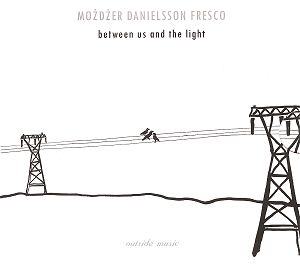Requiem 18/09
Light Up The Lie
Ex Ego
The O
Adama
Abraham’s Bells
Fake Master’s Hypnosis
Psalmem
Eden
Pub 700 (Between Us And The Light)
Abraham’s Bells
Like their 2005 release The
Time, Between Us And The Light received
a double-platinum award for selling more than
20.000 copies within two month of being released
in 2006. My question for The Time was,
if you don’t already own this album, why not?
The following question is purely rhetorical,
for if you already own The Time, then
you must surely also own Between Us And
The light?
If you want ‘more of the same’
then, of course, there is a familial resemblance
between these albums. The nature of the playing
is comparable, but the percussion has more
of a front seat in the more recent recording.
Zohar Fresco’s compositional credits are upped,
and in fact exceed those of Lars Danielsson,
but while his drums and sparkling percussion
alter the character of the music somewhat
the essential restraint and sense of subtle
colour are still very much in evidence, right
from the gorgeously deep rhythms in the opening
Requiem 18/09. His part is clearly
overdubbed on occasion, the slides of an Indian
tabla and a number of other rattles and taps
on tambourine-like instruments underpinning
the basic swing in a richly rhythmic number
such as Ex Ego in a way which clearly
indicates multi-tracking. The colour of the
music is also drum-led on occasion, with thudding
percussive bass piano notes adding timbre
to Fresco’s opening solo in Adama, whose
musical theme played on what sounds like either
electronically filtered cello strings or some
exotic keyboard effect has a movingly cinematographic
quality. That is one of the things I enjoy
about this trio’s approach – they all have
an honesty to the idiomatic qualities of their
instruments, but aren’t beyond confounding
the ear and making them sound unearthly and
unexpectedly different.
The nature of the music is
also given a number of atmospheric transformations
through Leszek
Możdżer’s playing of a variety
of effects on electronic keyboard. The
O for instance has sounds of waves and
quiet organ-like notes under a simple vocal
line by Fresco, and Abraham’s Bells also
begins with what sounds like sampled wind
effects.
Fake master’s Hypnosis begins
with one of those ‘yeah man, that was the
best’ commentaries from the mixing desk, which
adds nothing to the otherwise fine track which
follows. We had ‘warm up’ fragments in advance
of tracks in the 1960s from everyone from
the Beach Boys to The Animals, and the novelty
was either never extant or has long been extinct
– adding such blips is now the equivalent
of leaving the sprocket holes in trendy photographic
35mm prints, which convinces no-one that they
are being allowed in on the creative process,
or indeed any kind of in-joke. The opening
of Psalmem has a fragile quality which
makes it sound like a Piazzolla number from
beyond the grave, and he following piano solo
has a grave simplicity which makes one sad
and nostalgic in the same way wood-smoke does,
without anyone really knowing why.
The tempo is picked up with
Eden, which has all of the refined
and exquisite thematic directness and labyrinthine
harmonies that bring me back to this music
for a regular fix. A bass solo rich in harmonics
begins the (sub)title track, Pub 700 (Between
Us And The Light), followed by perfectly
conceived out-of-tune piano effects – presumably
made by playing a sampled piano transposed
a quarter-tone or so against the real one.
Zohar Fresco’s percussion and vocals return
to guide us through the slowly rolling rhythms
of Abraham’s Bells II
While I have enjoyed this album
greatly and will no doubt return to it often,
it doesn’t have quite the same enduring impact
and qualities as The Time. Maybe the
follow-up was a little too hard on the heels
of that brilliant disc, but in no way do I
wish to suggest that this is an attempt to
cash in on the former’s success. This is an
album which stands up well in its own terms,
has many fine tracks and gorgeous moments,
and should be on the wish-list of anyone who
appreciates fine and subtle playing, and the
ever-flowing undercurrent of creative composing
and improvisation which characterises this
trio’s music.
Dominy Clements
